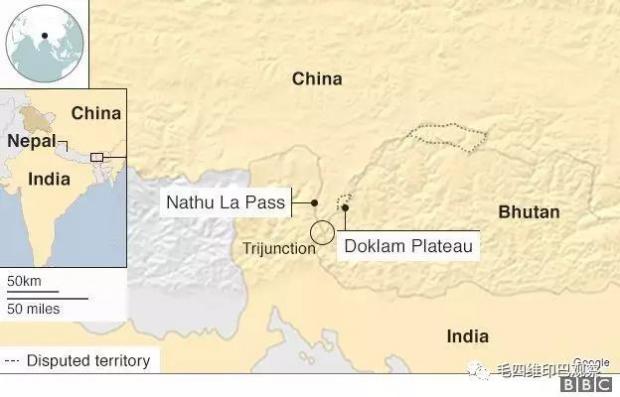阅读:0
听报道

毛四维编译
人民日报客户端8月9日报道,据印度报业托拉斯9日报道,不丹方面已经承认,现中印洞朗对峙地区并非不丹领土。这一消息是中国外交部边海司副司长王文丽在接待一印度媒体代表团时透露的。印报托援引王文丽的话说:“印军越界事件发生后,不丹方面非常清楚地告诉我们该事件发生地不属于不丹领土。不丹人也很奇怪为什么印度边境部队会进入中国领土。”
10日,据印度媒体报道,不丹官方人士通过电话对印度“亚洲国际新闻通讯社”(ANI)说:“我们在洞朗边境问题上的立场是非常清楚的。请查看我们在不丹外交部网站2017年6月29日发表的声明。”
由此,查看不丹政府声明的原文就成为必须。
现将不丹外交部6月29日以及印度外交部6月30日关于洞朗对峙事件的正式表态全文照译并附英文原文,供感兴趣者参考。
不丹外交部新闻稿
2017年6月29日
鉴于最近媒体对于不丹和中国在洞朗边境地区(的事态)提出许多质询,外交部愿就此发表如下意见:
2017年6月16日,中国军队开始修建从洞朗地区的多卡拉(Dokola)通往不丹军队在詹普里(Zompelri)营地的汽车道。不丹和中国之间的边界谈判正在进行中,我们在1988年和1998年达成书面协定,表示在边界问题最终解决之前,双方同意维持边境地区的和平与安宁,并维持1959年3月之前的边境现状。协定还载明,双方将不得采取单方面行动或使用武力来改变边境现状。
不丹在现场并通过外交渠道告诉中方,在不丹境内修建道路直接违反了(上述)协定,并对两国划界进程带来影响。不丹希望洞朗地区将维持2017年6月16日之前的现状。
印度外交部:关于洞朗地区的最近事态
2017年6月30日
2017年6月26日,中国外交部发表声明,声称印度边防部队在中印边界锡金段越界进入中国领土。此后,这在中国其他官方表态中多次提及。
一、有关事实如下:
1. 6月16日,中国人民解放军一支筑路部队进入洞朗地区试图修路。据我们所知,不丹王国军队的一支巡逻队曾试图劝阻他们不要采取单方面行动。不丹王国大使已公开表示,通过他们驻新德里的大使馆,他们于6月20日向中国政府表示了抗议。
2. 昨天,不丹外交部也发表了声明,强调在不丹境内修建道路直接违反了不丹与中国于1988年和1998年签订的协定,影响了两国的划界进程。他们敦促恢复2017年6月16日之前的现状。
3. 依照印度和不丹在涉及共同利益问题上保持紧密磋商的传统,不丹王国政府与印度政府随着事态的发展保持着持续沟通。
4. 通过与不丹王国政府的协调,印度在多卡拉(Doka La)地区的人员接近中方修路部队,敦促他们停止改变现状。这一努力仍在继续中。
5. 此后,在新德里和北京,印度和中国在外交部层面上一直在讨论此事。在6月20日举行的乃堆拉边防人员会晤中也讨论了此事。
二、印度对中国最近的行动深感关切,并告知中国政府,这样的建设将构成对现状的重大改变,对印度有重要的安全影响。
三、在此情况下,印方强调,双方政府在2012年达成协定,印度、中国和第三国之间的三方交界点有待与相关国家通过协商最后确定。因此,任何单方面决定三方交界点的企图都违反了这一谅解。
四、关于锡金段边界,印度和中国在2012年还达成一项谅解,再次确认双方认同其“基本走向”。关于最终确定这段边界的进一步讨论已在特别代表的框架下正在进行。
五、非常重要的是,所有有关各方都应显示最大程度的克制,各自遵守关于不单方面改变现状的双边谅解。另外重要的是,双方应严肃尊重印度和中国通过特别代表进程达成的共识。
六、印度对解决与中国的边界问题一直持积极态度,包括相关的三方交界点问题。
七、印度珍视印中边境地区的和平与安宁。这种状态来之不易。双方通过巨大努力,建立起机制框架,以讨论所有的问题,以确保印中边境地区的和平与安宁。印度承诺将与中国一道,通过对话,和平地解决所有边境地区问题。
新德里
2017年6月30日
Ministry of Foreign Affairs of Bhutan: Press Release
June 29, 2017
In view of the many queries raised recently in the media regarding the Bhutan – China boundary in the Doklam area the Ministry of Foreign Affairs would like to convey the following:
On 16th June 2017, the Chinese Army started constructing a motorable road from Dokola in the Doklam area towards the Bhutan Army camp at Zompelri. Boundary talks are ongoing between Bhutan and China and we have written agreements of 1988 and 1998 stating that the two sides agree to maintain peace and tranquility in their border areas pending a final settlement on the boundary question, and to maintain status quo on the boundary as before March 1959. The agreements also state that the two sides will refrain from taking unilateral action, or use of force, to change the status quo of the boundary.
Bhutan has conveyed to the Chinese side, both on the ground and through the diplomatic channel, that the construction of the road inside Bhutanese territory is a direct violation of the agreements and affects the process of demarcating the boundary between our two countries. Bhutan hopes that the status quo in the Doklam area will be maintained as before 16 June 2017.
Ministry of Foreign Affairs of India: Recent Developments in Doklam Area
June 30, 2017
The Chinese Ministry of Foreign Affairs made a statement on 26 June 2017 alleging that Indian border troops crossed the boundary line in the Sikkim sector of the China-India boundary and entered Chinese territory. This has been reiterated since then in other Chinese official briefings.
1. The facts of the matter are as follows:
i. On 16 June, a PLA construction party entered the Doklam area and attempted to construct a road. It is our understanding that a Royal Bhutan Army patrol attempted to dissuade them from this unilateral activity. The Ambassador of the Royal Government of Bhutan (RGOB) has publicly stated that it lodged a protest with the Chinese Government through their Embassy in New Delhi on 20 June.
ii. Yesterday, the Foreign Ministry of Bhutan has also issued a statement underlining that the construction of the road inside Bhutanese territory is a direct violation of the 1988 and 1998 agreements between Bhutan and China and affects the process of demarcating the boundary between these two countries. They have urged a return to the status quo as before 16 June 2017.
iii. In keeping with their tradition of maintaining close consultation on matters of mutual interest, RGOB and the Government of India have been in continuous contact through the unfolding of these developments.
iv. In coordination with the RGOB, Indian personnel, who were present at general area Doka La, approached the Chinese construction party and urged them to desist from changing the status quo. These efforts continue.
v. The matter has been under discussion between India and China at the diplomatic level in the Foreign Ministries since then, both in New Delhi and Beijing. It was also the subject of a Border Personnel Meeting at Nathu La on 20 June.
2. India is deeply concerned at the recent Chinese actions and has conveyed to the Chinese Government that such construction would represent a significant change of status quo with serious security implications for India.
3. In this context, the Indian side has underlined that the two Governments had in 2012 reached agreement that the tri-junction boundary points between India, China and third countries will be finalized in consultation with the concerned countries. Any attempt, therefore, to unilaterally determine tri-junction points is in violation of this understanding.
4. Where the boundary in the Sikkim sector is concerned, India and China had reached an understanding also in 2012 reconfirming their mutual agreement on the "basis of the alignment”. Further discussions regarding finalization of the boundary have been taking place under the Special Representatives framework.
5. It is essential that all parties concerned display utmost restraint and abide by their respective bilateral understandings not to change the status quo unilaterally. It is also important that the consensus reached between India and China through the Special Representatives process is scrupulously respected by both sides.
6. India has consistently taken a positive approach to the settlement of its own boundary with China, along with the associated issue of the tri-junctions.
7. India cherishes peace and tranquillity in the India-China border areas. It has not come easily. Both sides have worked hard to establish institutional framework to discuss all issues to ensure peace and tranquillity in the India-China border areas. India is committed to working with China to find peaceful resolution of all issues in the border areas through dialogue.
New Delhi
30 June 2017
话题:
0
推荐
财新博客版权声明:财新博客所发布文章及图片之版权属博主本人及/或相关权利人所有,未经博主及/或相关权利人单独授权,任何网站、平面媒体不得予以转载。财新网对相关媒体的网站信息内容转载授权并不包括财新博客的文章及图片。博客文章均为作者个人观点,不代表财新网的立场和观点。




 京公网安备 11010502034662号
京公网安备 11010502034662号 